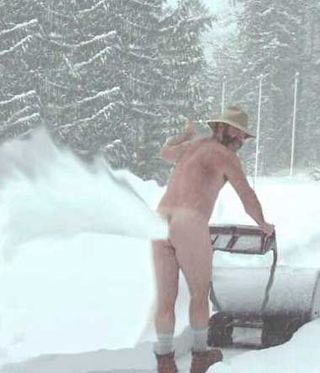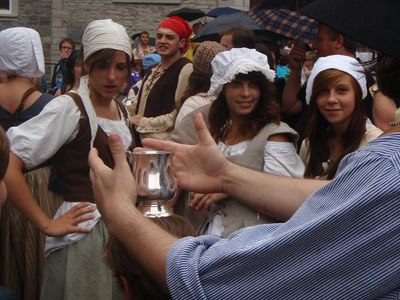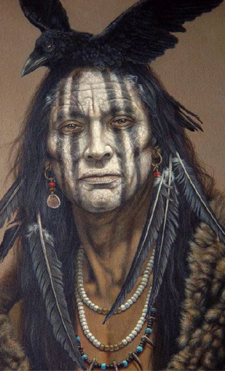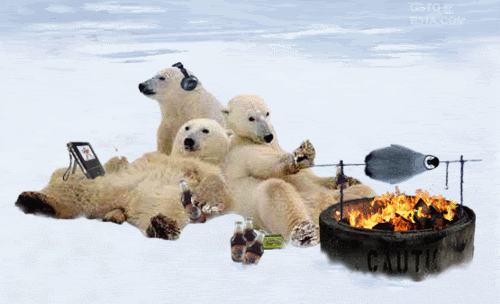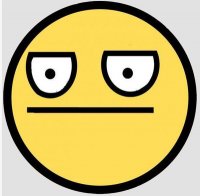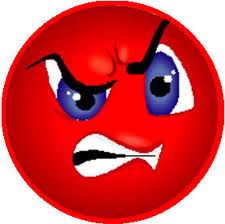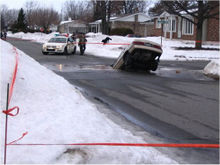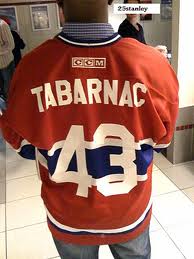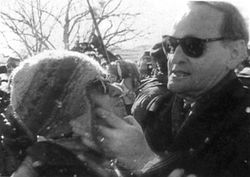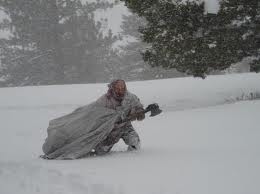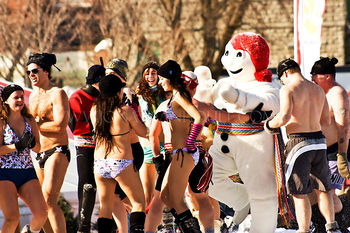Québec
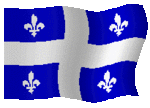
|
"Vive la Quebéc" |
“Vive le Québec... Vive le Québec LIBRE!”
– Charles de Gaulle shouting at thousands of half-drunk raging Quebecers
“The problem with Québec is that it is full of Quebecers”
– P.-E. Trudeau, admitting he is a problem. (Quebecers agree)
“Get the hell out of my ancestral lands!”
– Quebecers addressing the rest of Canada
Québec (pronunciation /kəˈbɛk/ or /kwɪˈbɛk/), is a province situated in Eastern Canada whose population always had a rebellious attitude. From the day the English conquered them in 1759 (because the poor blokes were not used to the indigens' "tobacco" and stumbled around the battle field like errands) to this day, they tend to see themselves as a distinct society, thanks to their particularity of being the only North Americans to predominantly use the French language. Truth be told, Québec sports a lot of outstanding traits. For example, it is the sole location in the world where you need to actually speak to someone before you know if you are going to be racist towards your interlocutor.
The province could also be labeled as communist due to its free health care system, government policies actually caring about the poor and the tendency to share STDs. The overwhelming majority of the population is against the Afghan war, unlike their Canadian counterparts. They are however quite favorable to camel imports from said country.
The pot produced in Québec is a National pride (Québec Gold). A single puff will cause you to laugh at a light pole for hours.
It is to be noted that the renegade attitude of the inhabitants is certainly derived from the fact that a considerable amount of their ancestors were prisoners in France who were presented with 2 choices: either go and settle New France or rot in jail. Tough choice to make indeed.
The amazing healthy curves the women are exhibiting can be explained by the fact that France's King sent his most beautiful and healthy concubines (the "Filles du Roi") in order for the settlers to produce the strongest and mightiest offspring possible so that they could endure the harsh conditions of the new land. The end result of this wholesome mix is your modern-day Quebecer.
History/La Fantastique épopée
First contact/Premier contact
In 1534, Jacques Cartier managed to find the Gaspesian peninsula and planted a cross there. He was greeted by a flock of arrows shot by the Natives, who obviously thought his crew were demons from an unknown world. Cartier finally gained their sympathy by offering them mirrors and knives. Feeling a little bit guilty for the "THIS IS AMERICAAA!!!" welcome, the Amerindians showered the strangers with beaver and bear furs as gifts. A relationship of friendship and trust was born. Upon their arrival back to Europe, Cartier and his sailors were almost shot on sight when disembarking because the Europeans mistook them for unknown animals thanks to their new furs.
Québec City founded/Ville de Québec fondée
In 1608, Champlain founded Québec City. He was compelled to spend the winter there by a young, very promiscuous Amerindian damsel. However, his crew and himself were soon plagued by a new illness: the scurvy. That's when the Natives' herbal knowledge came into play. After smoking the weed with a calumet, all illnesses were gone, and the supplementary benefit which consisted of seeing little Pink Elephants was not displeasing at all. They spent the winter high as hell and set sail for home in the spring with a great load of the herb on board. Champlain and his remaining crew got lost numerous times on the way back to Europe, wandering in circles in the Atlantic Ocean and even mistakenly coming back to Québec (they put that mishap to profit by replenishing their herb stock). They convened to make a little detour on their returning trip, stopping in Maya, where they hoarded crates full of chocolate to satisfy their munchies. Some argue that it is a miracle that they finally managed to land on Europe's shores safely.
The British victory/La crosse britannique
In 1759, the greedy British Army had their sights on the land rightfully appropriated from the Amerindians by the happy people of Québec city. General Wolfe urged the French people to surrender the town. Not one to capitulate without a fight, (this will baffle all French historians) the leader of the Resistance, Montcalm, famously retorted:
“I'll answer you by my cannons' mouths!”
– Montcalm, exhibiting great self-confidence
The battle raged on for days when in a surprising turn of events, the cannons' mouths ultimately stopped shouting due to a cannonball shortage. After using all the city's bowling balls in a desperate maneuver, a bitter and demoralized (and dead) Montcalm had to concede defeat.
Since that time, the English people have tried by all means possible to subdue Québec's population into abandoning the melodious French language and take up English: mass deportations, discrimination, playing Céline Dion's songs in the cities at night, etc. Some 250 years later, those efforts have proved to be in vain: the stubborn Quebecers still speak La Langue de Molière.
The Patriots/Les Patriotes
In an event that is still talked about today in the province as the most heroic act to have graced the Land, an uprising orchestrated by a group calling themselves Les Patriotes led to the adoption of a Declaration of Independence that granted equality to the exploited French people and affordable poutine prices. In 1838, Papineau led his renegade companions to an overwhelming victory in what would go down in history as "The Battle of Saint-Denis". Armed with pitchforks and slingshots against rifles and cannons, they managed to hold on to their positions until the British finally sent all their forces in the mosh pit, outnumbering the rebels 246 to one. In an incredible act of cruelty, they set ablaze the church of St-Eustache where the last Patriots were hiding, turning those poor souls into BBQ'd martyrs. Quebecers will NEVER forget the Patriots, unless of course there's a good sitcom on TV tonight.
Notorious cities in Québec/Célèbres patelins du Québec
Here is a sample of hunting shack agglomerations and lumber camps you can find up there:
Montreal/Montréal
The largest French-speaking city outside Paris, Montreal was named after the soil elevation in its center called "Mount Royal". Its inhabitants are called Montréalais, which in English roughly translates to "heirs of the Great Flying Moose". One of the metropolis' greatest attractions is the Oratoire Saint-Joseph, a religious landmark where the vendors will attempt to sell you the authentic Shroud of Turin for a mere $200. Two for $350!
Montreal is the home of the Big Owe (le "gros bol de toilette"), a baseball stadium that is now as useful as a refrigerator in Antarctica. It was home to the financial disaster known as the 1976 Summer Olympics and the now-defunct Montreal Expos baseball club. It now hosts the annual North American horseshoe throwing contest. The building is quickly falling to rubble thanks to the overly lazy city workers.
In 2008, Formula One swiftly left the place since the potholes in the racing circuit were getting out of control. Once again, the idleness of city workers is to blame. While much of the city is nice, a walk to the city's East side will traumatize you: going around the hobos who try to rip you of your money can qualify as an endurance sport and stopping your dodge-and-walk maneuvers to contemplate the ugliness of the place will cause you to faint (and then wake up stripped of your possessions and clothes).
It is also worth mentioning that key Montreal exports include smoked meat, beer and hockey players. Imports mostly include bottle openers, flip-flops and very sadly, English people.
Did you know? ...that there are more pedestrians hit by cars on the Island of Montreal than anywhere else in the province? It is believed that the city's drivers see the walkers as balls in a pinball machine, and think their cars are the flippers.
Quebec City/Ville de Québec
The oldest city in North America (founded 1608), Québec City is known as "La Vieille Capitale" (The Old Hag). The architecture and cuisine will remind the visitors of Europe, minus the smelly people. The chilly temperatures are compensated by the hotness of the women. They radiate so much heat that they virtually keep the city snow-free. A downside to this is that they sometimes cause flooding right in the middle of winter.
The city is also known for its narrow, awkward roads which mostly run vertically as the place was built with walled fortifications by Montcalm to keep the English invaders out. You'll need a V12, 1000 hp engine to climb some of the National Capital's steepest streets. A parachute is heavily recommended for the downhill ride.
The only industries are "la function publique" (it is estimated that 107% of the population works for the communist government) and tourism; the citizens have to endure the English-Canadians that keep invading every year. Quebecers smile, take their cash and laugh at their stupid superficial manners when they are gone.
Lately, in 2008, the citizens of Québec City invested tremendous amounts of their tax dollars in order to commemorate the 400th anniversary of the glorious Motherland. During this year of celebrations, the city's mayor (a notorious dictator whose idolisation of Napoleon is well-known) kidnapped Sir Paul McCartney and forced him to sing in the middle of a grassy field, thus attracting half of the entire province's population.
Did you know? ...that there is a city law protecting poutine? There is a violation charge of $200 for anybody that wastes poutine or expresses a mild dislike for it. A second offence will get you deported at best. The worst (but plausible) scenario is that you'll never make it out of the restaurant alive.
Ottawa-Gatineau
It basically is an abandoned lumber camp. Home of Scott Paper and Domtar (2 paper-making companies that will please the toilet enthusiast), the population of Gatineau is mostly composed of government English Canadian double agents who try to infiltrate the populace to assess the threat of rebellion but fail miserably thanks to the innate ability of a Quebecer to sniff a phony from a mile away.
Don't bother asking asking a Quebecer for directions to "la région de la Capitale Nationale"; they don't have any idea where in the hell is Ottawa, or if it even exists (or any English city for that matter). They will most likely misdirect you to Quebec City. Montrealers will look at you strangely, yawn and get on their way.
Did you know? ...that Ottawa is the capital of a country named "Canada"?
Chicoutimi
Located amongst the Saguenay River fjords near Lac St-Jean (home of the chocolate-covered blueberry), Chicoutimi exists to produce aluminium. Now named Saguenay, it is the proud home of the first and only aluminium bridge in the world. While the bridge is lightweight and requires no maintenance, the high cost of electricity that was required to produce the material needed to build the structure in the first place is astonishing. It is a useful tool to perform mind-control experiments on the population, since the electro-magnetic field created by the bridge can penetrate the sturdiest of tinfoil hats.
One of the first thoughts that were implanted in the minds of the inhabitants via the bridge is that only one Saguenay's blueberry is required to make a whole pie. The poor Saguenéens now roam the land mindlessly professing that fact, much to the dismay of their fellow countrymen.
Did you know? ...that back in the New France days, the Saguenay forts were defended by magically-enhanced snowmen and beavers?
Laval
Laval is a Montreal's suburb known for its warm people and falling viaducts and buildings. Unfortunately, the latter tends to claim the lives of said warm people. A great pastime for the citizens is to bet illegally on which infrastructure is going to crumble without warning next. Last year's winner Jean Tremblay successfully predicted the collapse of 2 major bridges. He was just a little off about the total casualties (39). When joined by phone, the happy winner said he'll use the money to get the hell out of Laval before the whole city caves in and becomes a part of the St. Lawrence River.
Did you know? ...that a Lavallois has a greater chance of dying as a result of a major building/infrastructure falling on or under him/her than one day having the common sense to actually move out of town?
Chibougamau
It is not yet confirmed whether this town exists or not. It's been rumoured that some people live somewhere North of Lac St-Jean and Val-d'Or, yet the geographical remoteness and the inhumane climate those people would have to endure make this whole allegation more of an urban legend than a real town. Furthermore, people living in such a place would necessarily be born with a disease which would cause them to hate, or fear civilization. Because nobody is willing to travel up there to verify the presence of human lifeforms, and the hypothetical inhabitants being genetically too shy to come down South, Chibougamau is likely to remain a mystery...
Politics/Les Mensonges
Historically, Québec's most popular politician was Maurice «Rocket» Richard of the «Habs» Party. The fact that he was once excluded from the playoffs sparked riots which ultimately led to "La Révolution Tranquille". He reigned from 1940-1975, when he was killed by a flying hockey puck. The most extreme Quebecers mourn the pain their messiah endured each year by being nailed to hockey goals, carried to a downtown ice rink in a religious-type procession and then ruthlessly being slapped-shot on by the crowd.
Since that time, some other politicians took the throne with mixed results. There has been two major events in "recent" political history: the referendums asking the citizens for the sovereignty of the Motherland.
1980 Referendum/Référendum de 1980
René Lévesque, a funny chain-smoking pygmy, was elected to bear the weight of the power in Quebec's Kingdom. He was however recognized as far more than a likeable living chemney when he had the balls to create Bill 101, a law that would make any English-speaking person within Quebec's territory a terrorist. Furthermore, he held a referendum to ask the population if the incestuous relationship with Canada was beginning to bore them and if they wanted to play solo. A well-known traitor to the Nation, Pierre-Elliot Trudeau (Pet), promised to re-open the Constitution if Québec voted to remain in Canada and save the ailing marriage. Lévesque was so nervous in the weeks leading to the big poll that he started producing more smoke than a dragon.
The referendum was ultimately lost for the separatists who were stabbed in the back when a "new" Constitution (even worse for Québec than the previous one) was signed by the other provinces after they distracted Lévesque with call girls. This went down in history as "La Nuit des Longs Couteaux" ("The Night Québec got screwed"). After dragging himself out of bed the next morning, Quebec's ruler was faced with the accomplished facts. This led the poor René Levesque to the brink of a deep depression, and he fired everybody around him before starting to smoke twice as much, turning out more ashes than an erupting volcano.
1995 Referendum/Référendum de 1995
On October 1995, a slightly obese moustachioed man going by the name Jacques Parizeau rolled the dice again. He had the advantage of being a non-smoker, which meant he was actually able to pronounce his speeches from start to finish without choking, unlike Lévesque. He could also be seen clearly on the TV screen.
With the strong probability of a sovereigntist's victory on the horizon, the Canadian government started to panic: they promised a Maple syrup can and a free Canadian flag in exchange for a "No" vote. They also sent 100 000 crazed fanatics from Ontario whose job was to attempt desperately to convince Quebecers into remaining a part of Canada; "We love you! We need you! Please don't go!" Quebecers stared at them with a puzzled look; they didn't understand a word they said.
Panicking more than ever, Canada's Prime Minister Jean Chrétien gave it all the national GDP could withstand and bonified his previous promise by adding 25 coupons for free poutine per citizen if the "No" camp was to be victorious. On the fateful night, Quebecers had to choose between their passion for freedom or their love affair with poutine. The result: 49,5% Yes and 50,5% No. Civil war immediately erupted, shop windows were smashed, there is even reports about half-full beer bottles being thrown. Jean Chrétien then honored his offer and compensated the costs via tax increases for Québec exclusively.
“We've been beaten. By whom? The rich and the English!”
– Jacques Parizeau, checking to see how fast he would be demoted after speaking the truth
Québec-France relationships/Relations Québec-France
Québec always had a love-hate relationship with their European cousins. Some argue that it is because France discarded Quebec like an old sock when things got intense during the New France's wars. Others say there is resentment in France since Québec has a limited French wine importation because Quebecers would rather get drunk with their own booze.
How Frenchies see Quebecers/Comment les français trouvent les québécois
- They believe Quebecers are a bunch of funny hillbillies that make a living from hunting and fur trading.
- They really think Québec's artists who export their craft over the pond are fleeing constant moose and bear attacks. The aforementionned artists' obvious goal is to take the Frenchies' Euros while trying not to catch the local accent (or fleas for that matter).
- Upon their arrival in "la Belle Province", France's tourists always spark off a laugh roller coaster thanks to the 2 rifles and trapper gear they are sporting.
How Quebecers see Frenchies/Comment les québécois trouvent les français
- Incredibly annoying accent.
- They consider them to be pretentious, snooty narcissists who would do anything to put forth their own self to the detriment of other, more deserving individuals than their self-centered, egotistical person.
- They like them anyway.
Economy/Économie
The economy is pretty diversified, with of course a strong emphasis on various agricultural productions:
- Potato--->End product: Poutine
- Beans---->End product: Farts
- Wheat---->End product: Booze
- Pot------>End product: Pothead
- Trees---->End product: Maple syrup
Québec's most sought after job is without a shadow of a doubt becoming a professional hockey player. From a tender age, pressure is bestowed upon the children to perform at this sport while the parents are drinking in the stands, insulting their children's opposite team and teammates and fighting one another in brawls that make a riot look like ballet.
Another glamorous occupation is impersonating the Bonhomme Carnaval at the Québec Carnival. The guy's main job consists in saluting the crowd, performing ridiculous foot-to-hand movements and dodging snowballs and empty beer bottles thrown in bunches by Carnival participants while riding a moving float and wearing a 150 pounds costume. Hardcore athletes only.
A sample of more traditional careers include lumberjack/lumberjill, maple syrup producer, and beret-maker.
In conclusion, Quebecers will welcome English speaking people with open arms! (as long as they keep their return ticket.)
